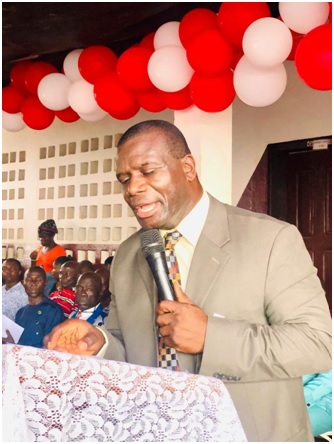As I reflect on the ongoing discourse on academic credentials of colleges and universities’ presidents and vice presidents for academic affairs within Liberia, I have thought to share my thoughts on the critical importance of academic credentials and academic and administrative positions in academic sphere in a two series article. In executing this task, I have generally delineated the differences between the Doctor of Philosophy (Ph.D.) and professional terminal doctorates; e.g. Doctor of Education (Ed.D.), Doctor of Ministry (D.Min.), Doctor of Public Administration (D.PA.), Doctor of Medicine, M.D.), Doctor of Legal Law (L.LD.), Doctor of Economics (D.Ec.), etc. as there is seems to be a lot of misunderstanding in Liberia about these credentials. In addition to these credentials, I have also set to provide a succinct deliberation on the differences between “an earned doctorate” and “an honorary doctorate” and the reasons for which they both are awarded.
In the first part of this discourse, I have focused on the two kinds of earned terminal credentials (Ph.D. and professional doctorates) and the honorary doctorate and the reasons for which they are earned or awarded and in the second part of this article, I will discuss the college and/or university presidency, the professor, lecturer, adjunct faculty and administrative positions such as dean, department chair, program director and faculty rankings across universities and colleges as it is generally accepted by scientists, practitioners and policy makers in the field of higher education.
I come to this discussion with academic training and practical knowledge in the field of higher education. After undergraduate education from the Jacksonville Theological Seminary in Jacksonville, Florida, I earned a Master of Arts (M.A.) degree in Educational Leadership from Luther Seminary in St. Paul Minnesota. I also earned a Master of Arts (M.A.) degree in Higher Education Policy and Administration from the University of Minnesota, Twin Cities Campus. I subsequently went on to earn my Doctor of Philosophy (Ph.D.) in Higher Education Policy and Administration with minor in International Education from the University of Minnesota, Twin Cities.
Prior to and after graduation from graduate school, I worked in the higher education environment for over fourteen years as a student personal administrator at Luther Seminary, St. Paul, Minnesota, Northwestern Health Sciences University, Bloomington, Minnesota, as vice president for academic affairs at the African Methodist Episcopal University, Camp Johnson Road, Monrovia, an associate professor, the Director of the Graduate Program in Education, a dean and acting Executive Director for the Teaching and Learning Center at the University of Liberia and founding President of the Bong County Technical College. The Teaching and Learning Center at the University of Liberia was approved and established by the University’s Faculty Senate and Administrative Counsel during my directorship.
In addition to my training and work in the world of higher education, I have also been a member of several higher education professional organizations in the United States including the American College Personal Association (ACPA), the Minnesota College Personnel Association (MCPA), Minnesota International Educators, National Association of Multicultural Educators and a member of the Association of Institutional Researchers. All of these organizations are membership organizations that include higher education professionals in several different disciplines in the field of higher education in the United States.
Considering my training and experience in the field of higher education, I have deemed it expedient to share my thoughts on the current discourse and policy conversation taking place in Liberia; especially as it relates to the issues of credentials and their applicability to higher education careers (positions) with focus on the university or college presidency, faculty and administrative positions.
Academic Credentials
As a career counselor in college, I always asked my counselees what they were most passionate about when they sought advices about making career choice decisions. I also do that with my children. I have a daughter who graduated with her Bachelor of Science in Natural Resources Management in 2022 and I currently have four daughters in college studying Accounting, Information Technology, Nursing and Management. When I advise my children about choosing a life time career, I take them through the same route of “what is your life passion?” This question answers the question about the decisions individuals make about what they intend to study in college when they enroll. And to a greater extent, it provides the rational for how and why academic credentials were and are being created today.
In the field of higher education, there are discourses and sometimes confusions about the curricula content for a given credential. The discourse among scientists and practitioners have most often centered on several disciplinary fronts (social science, humanity, hard science, technology, etc.). Whatever way these discourses have happened, they have always pointed in two general directions; Science and Arts. And this is evident in the nomenclatures given to academic credentials from the very beginning of university or college credential system. For example, at the Associate’s degree level, there are two types of associate degrees; they are Associate of Arts (AA) and Associate of Science (ASc). At the bachelor’s level, there are the Bachelor of Arts (BA) and the Bachelor of Science (BSC). At the Master’s degree level, there are the Master of Arts (MA) and the Master of Science (MSC) and then at the terminal degree level, there are the Doctor of Philosophy and professional doctorates. I am cognizant of the fact that there are professional degrees from the associate level to the terminal degree level (e.g. B.Th., B.Agri., B.Eng., M.Eng., M.PA., M.Th., D.Phil., D.Pharm., D.Ec., etc.). When critically examined, all of these professional credentials and their curricula contents point to either the arts of the professions or the science thereof of the career for which students are trained. For example, students who earned Bachelor of Engineering degrees are trained as practical engineers. They spend a lot of time doing practical while they are in training. In fact, they acquire more training than teaching. And this general assertion goes with almost all professional degrees. This of course, I could argue is an “Art” of a given profession. So in summary, whether a degree is practical or is scientific or research base, it is either an “Art” or a “Science” of a given career base on the curricula content and the mission of the institution that created the degree.
Considering the context of the doctoral degree, there are two sets of earned doctoral degrees and the honorary doctorate (honoris causa). The first is, and this is not in an order of importance, the Doctor of Philosophy (Ph.D.) and the second set comprises of several professional doctorate degrees and then of course the honorary degree.
First, the history of doctorate degrees. The origin of the awarding of doctoral degrees, is not clear. However, there are literary evidence that the doctoral degrees has existed for several hundred years (Bolge, no date; Nelson, 93). Bolge asserts that doctoral education emanated from France in the 16th Century. According to Bolge, scholars in French and German Universities around this time were thought of as “Masters” as they were credited for creating and dissimilating knowledge. By the 17th Century, Bolge asserts that the idea of the PhD was born and scholars were trained as PhDs to serve various universities in Bologna and other European universities. From the view point of Bolge, the PhD was designed to trained scholars as researchers who would be “creative, critical, autonomous intellectual risk takers”. As creator of knowledge, and unlike of other professional doctorates, the PhDs were trained to serve as the originator of knowledge and they were trained to serve as faculty and university administrators.
While doctoral education was making progress in Europe, American universities and universities on other continents were also developing doctoral programs for the development of their universities and colleges. In 1861, Yale University awarded the first PhDs in the United States to three candidates; James Whiton, Eugene Schuyler, and Arthur Wright. By the turn of the 18th Century several universities in Europe, America, Africa and Asia were running doctoral programs, both PhD and professional doctorates. In 1948, Melbourne University awarded its first PhD in Australia. By 1947, all six universities in Australia were offering PhD programs. By the turn of the 21st Century, over 90% of countries in the world were offering doctoral education. Liberia is one of very few countries in the world that do not provide doctoral education to its citizens.
Second, the differences between the credentials (PhD and professional doctorates). The PhD degree is designed to train students for academic qualifications. Such training develop students through rigorous theoretical methodologies for the sole purpose of enabling them to create new knowledge in a given field or profession. For example, the PhDs in accounting are expected to be the ones who develop or continue to improve knowledge in accounting principles and create new trends in the accounting profession. On the other hand, the Doctor of Accounting are expected to be the professionals in the field of accounting who are expected to applied the new knowledge, principles and designs that are developed by the PhDs. Let’s consider two persons; the one with PhD in Accounting; let’s call him John. The one with Doctor in Accounting. Let’s call her Mary. John is expected to continue to research what is happening in the world of accounting. And base on his research, he is expected to share his findings through teaching at the university or through presentations at seminars in professional or policy setting. Mary on the other hand, is expected to take these empirical findings and applied them to real world situations in the accounting environment; whether audit, banking or public policy. In this example, you will agree that the two persons need each other to enable the accounting career to continue to thrive as a viable career that is needed for society.
In professional work environment outside of academia, it is most often not seems to be a problem in terms of who is in charge of the WORLD. But we run into problems most often when we enter academia, especially in the walls of the university. There is often the quest for who is superior; PhDs or Professional Doctorates? In academia, PhDs think they rule the world while professional doctorates argue that the world will not spin if they did not exist. The both credentials complement each other and jealously protect the academic environment against intruders.
Conclusively, you will understand that both credentials are critical for the development of institutions and nations. Whether PhD or professional doctorate such as Doctor of Legal Law, Doctor of Ministry, Doctor of Engineering, etc., every terminal degree is a milestone achievement and should be treated with honor.
Third, using honor, let me turn to the honorary doctorate degree. The honorary doctorate degree is awarded by an accredited university or college that has met all accreditation requirements by the country or institution that is required to accredit institutions of higher learning in its locale. The degree is awarded in recognition of services that a person (the awardee) has perform and that that service is recognized as been equal to achieving the maximum benefits in the career. It is worth remembering that the doctorate degree (whether PhD or Professional) is the highest academic credential in any profession and it is treated as such by any university, institution, country, etc. Because of its importance, no serious minded university or college awards an earned doctorate degree to any student or learner without straight standards.
I remember my days at the University of Minnesota as a doctoral student when I had to take over sixty credit hours in statistics, university administration, government policy, education laws, development studies, ethics, counseling, psychosocial theories and practices and the list goes on. As though that was not painful enough, I had to do over a hundred presentations base on empirical investigations, sit written preliminary exams and provide real world solution to proposed problems, do a dissertation proposal before a team of faculty who one cannot “lie to”. A team of people who read all the research in their fields, get all the current published research articles, all the current and past books, are subscribed to all the journals in their fields and are members of most of the professional organizations in their fields. A team of people who are hired by governments, the UN and organizations that are concerned with issues within the career in which they work. Imagine them looking at you in the face and saying to themselves, “he wants to be one of us”. And when they say you have met all preliminary requirements, you can now go ahead and do a dissertation; at this point, you know you are going through the rigors of earning a PhD. That’s why over 50% of PhD students stay as ABDs.
I brought in that experience to share the seriousness with which universities guard or protect the credentials they award to their students. Hence, the awarding of an honorary degree was set as a means of recognizing people who for several reasons could not attend regular universities but had perform so were within a profession that they needed some form of recognition at the highest level. To be awarded an honorary doctorate, you must have serve in a given career, enormously contributed to that career and should be, at the time of the award, providing services in that career. In conclusion, honorary doctorate degree is solely base on an individual contributions to a career. As such, no university is authorized through its privilege of autonomy to grant an honorary doctorate to any person who has not perform to the peak of the given career into which the person is admitted as honoris causa. Let me depart this point with an example. If the University of Liberia decided to awarded an honorary doctorate degree in education to a person. The faculty senate of the university should ask the Board of Trustees, the awarder of the degree the following questions. What is the candidate’s contribution to the development of education in Liberia or globally? Has the candidate developed or contributed knowledge, systems, models to the development of education nationally or globally? Who has benefited from the candidate’s work? Is the candidate’s work enduring? These questions and many more in addition to a thorough investigation of the candidate’s work should be taken into consideration before they are considered for an honorary doctorate degree.
Failure on the part of any academic institution to do due diligence prior to awarding an honorary doctorate degree to a person is an abuse of its autonomy under any accreditation law. In fact such action diminishes the image of any university or college. In the world of academia, such honorary credential is considered as fraudulent as it did not meet the required standard as is enshrined in best academic practice. It is worth noting that there is no such thing as “honorary PhD”. The Doctor of Philosophy is never awarded as an honorary degree.
It is also a generally held principles that recipients of honorary doctorate degrees are not to be called “Dr.” (e.g. Dr. John) if they have not previously earned a terminal degree. The only accepted exception is when they attend academic programs, (e.g. graduation ceremony). In this instance, the name of the person is called and “honorary” or “honoris Causa” is mentioned.
What I endeavored to do in this first part of two series has been to discussed the two kinds of earned terminal degrees; the Doctor of Philosophy and other professional doctorates and the honorary doctorate that is awarded to an individual in recognition of service. An understanding of these credentials is critical for people in academia, for policy makers, for advocates and for the general public. I hope this reflection will serve as a tool to help clarify some of the confusions that exist in Liberia about academic credentials, especially terminal degrees.
In the second part, I will discuss the qualification of a college president, faculty rankings, college administrative positions and who is qualified to head an academic institution.
By Assoc. Prof. John S. Flomo, Jr. (PhD). © 2023






